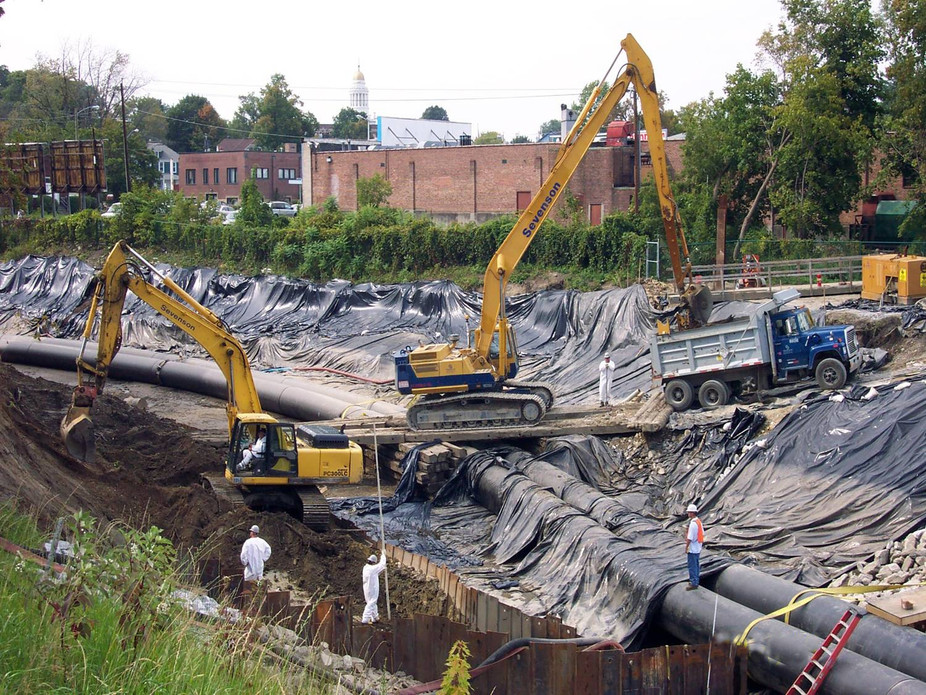Next year will mark the 40th anniversary of the Love Canal crisis, when toxic chemicals were found to be leaking from an underground dump into homes in Niagara Falls, New York. State and federal agencies relocated more than 200 families out of the affected area. A state investigation later found elevated rates of birth defects among families who had lived at Love Canal.
This disaster called public attention to health risks from improperly controlled toxic waste. In response, President Jimmy Carter signed the Comprehensive Environmental Response, Compensation and Liability Act (CERCLA), commonly known as Superfund, into law in December 1980.
Superfund has supported cleanups of toxic waste sites in all 50 states as well as the District of Columbia. But its funding decreased by nearly half between 1999 and 2013, and President Trump’s 2018 budget proposal calls for an additional 30 percent cut, despite EPA administrator Scott Pruitt’s assertion that Superfund is “absolutely essential.”

Protesters in the Love Canal neighborhood of Niagara Falls, New York demand compensation for families that have been told to evacuate from their homes because chemicals are leaching to the surface, Aug. 5, 1978. AP Photo/DS
As an economist specializing in housing issues, including the relationship between toxic cleanups and property values, I have published several studies of Superfund sites. In my view, further funding cuts will make it extremely hard for EPA to clean up more than 1,300 sites still on the Superfund list. Slower cleanups will leave more people exposed to harm from toxic chemicals and will hurt adjoining communities by lowering property values and impacting future development.
Making polluters pay, where possible
Under Superfund, EPA has the power to place heavily contaminated sites on a National Priorities List, and find and force parties responsible for the damage to pay for cleaning them up. Initially, if polluters could not afford to pay or the responsible parties could not be identified, cleanups were to be financed from a trust fund supported by a tax on chemical companies and crude oil.
In the program’s early years, only a few sites were cleaned up and minimal funds were recovered from responsible polluters. To speed up remediation, Congress passed the Superfund Amendments and Reauthorization Act (SARA) in 1986. SARA directed EPA to pursue permanent remedies for toxic contamination rather than seeking simply to contain waste. It also increased the trust fund from US$1.6 billion to $8.5 billion. Three further rounds of reforms in the 1990s expanded public involvement and enforcement, highlighted environmental justice and attempted to make the program more cost-effective.
In 1995 the Superfund tax expired and Congress did not renew it. Critics argued that EPA spent too much money on litigation trying to get polluters to pay, that few sites were cleaned and that those that were cleaned took longer than necessary. In addition, they asserted that sites should be cleaned up to levels that were appropriate to their future uses, rather than to a uniform level.
Since 1995, although a majority of cleanups have been paid for by the responsible polluters, EPA has requested funds from Congress to remediate sites where the polluter cannot be identified or has gone out of business. The state where the site is located pays 10 percent of costs for these projects.
Between 1999 and 2013 Superfund appropriations decreased by 45 percent, from $2.1 billion to $1.1 billion, although EPA received an additional $600 million through the American Recovery and Reinvestment Act in 2009. According to the U.S. Government Accountability Office, funding shortfalls forced EPA to delay the start of approximately one-third of new projects that were ready to begin during this period. Spending at cleanup sites fell from roughly $700 million yearly to $400 million annually, and the number of project completions declined by 37 percent.
Nearly one in six Americans lives within three miles of a Superfund site.
Health and economic payoffs
In spite of shrinking budgets, Superfund has been relatively successful. In total, 392 sites have been cleaned up and delisted, ranging from landfills to former military sites. Currently there are 1,337 sites on the Superfund list, with another 53 proposed sites under review. At Superfund sites that are being reused, EPA estimates that in 2014 approximately 3,400 businesses were operating, generating $31 billion in sales and employing 89,000 people.
Research shows that removing toxic waste from these sites provides major health and economic benefits. A 2011 study estimated that cleanups reduced the risk of congenital anomalies in newly born babies living near sites by 20 to 25 percent. Another study estimated that residential property values that were within three miles of a cleaned and delisted Superfund site increased by approximately 19 to 25 percent between 1990 and 2000.
Toxic waste sites also raise environmental justice concerns. Several analyses have found that neighborhoods around Superfund sites tend to be lower-income and have more minority residents. One study examined the duration of cleanups and found that sites in neighborhoods that were black, urban and had lower-income residents took longer to be cleaned up prior to 1994. However, this effect diminished over time – possibly as a result of SARA reforms that required program managers to give greater weight to environmental justice concerns.
Doing less with less
In 2016 the Environmental Protection Agency received approximately US$1.1 billion from Congress for the program and obtained nearly $1 billion from identified polluters of Superfund sites. President Trump’s 2018 budget asserts that cutting support for Superfund by 30 percent will reduce administrative costs and make the program more efficient. It also calls on EPA to find ways to return sites to community control more quickly.
Superfund budget reductions over the past decade reduced the number of sites cleaned up and increased the time required to complete them. If EPA is expected to clean up more sites at a faster pace, cuts will have to come from other parts of the program, such as enforcement, research, planning and preparing for emergencies, such as oil spills and chemical releases. Scott Pruitt may praise Superfund, but if he wants to reduce the cleanup backlog and get more properties back into use, he will have to fight for it.
 Katherine Kiel received funding from the U.S. EPA in the 1990s for research on the impact of toxic waste sites on housing prices.
Katherine Kiel received funding from the U.S. EPA in the 1990s for research on the impact of toxic waste sites on housing prices.



 Indian Refiners Scale Back Russian Oil Imports as U.S.-India Trade Deal Advances
Indian Refiners Scale Back Russian Oil Imports as U.S.-India Trade Deal Advances  Nikkei 225 Hits Record High Above 56,000 After Japan Election Boosts Market Confidence
Nikkei 225 Hits Record High Above 56,000 After Japan Election Boosts Market Confidence  Oil Prices Slip as U.S.-Iran Talks Ease Middle East Tensions
Oil Prices Slip as U.S.-Iran Talks Ease Middle East Tensions  Gold and Silver Prices Rebound After Volatile Week Triggered by Fed Nomination
Gold and Silver Prices Rebound After Volatile Week Triggered by Fed Nomination  Lee Seung-heon Signals Caution on Rate Hikes, Supports Higher Property Taxes to Cool Korea’s Housing Market
Lee Seung-heon Signals Caution on Rate Hikes, Supports Higher Property Taxes to Cool Korea’s Housing Market  Asian Markets Surge as Japan Election, Fed Rate Cut Bets, and Tech Rally Lift Global Sentiment
Asian Markets Surge as Japan Election, Fed Rate Cut Bets, and Tech Rally Lift Global Sentiment  Nasdaq Proposes Fast-Track Rule to Accelerate Index Inclusion for Major New Listings
Nasdaq Proposes Fast-Track Rule to Accelerate Index Inclusion for Major New Listings 
































